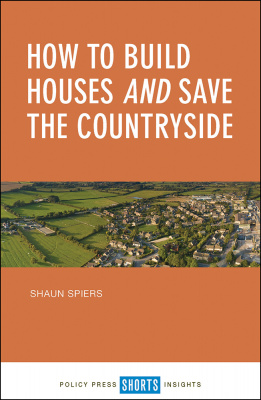
This book is written by a former MEP, a former boss of the Campaign to Protect Rural England and the current Director of the think-tank Green Alliance. Shaun Spiers has been knocking around the policy and political world for a good few years and he’s no fool (no fool at all) and so his views, based on much experience, deserve a good hearing.
Here he tackles a tricky issue and claims to find a way through the rows and disagreements.
We need more houses and they have to be built somewhere – but much of the ‘somewhere’, if we talk about the countryside – is under threat and is according to many measures losing its defining qualities. So should we build more houses on green fields and even on Green Belt land? Or is that a house too far?
Do we need to redefine the Green Belt (in the same way that nature conservationists might like to consider whether we should redefine protected species)? And if so, do we trust the present government or any other government to do this fairly and well? And if not then who should do so? Or is this can of worms best kept tightly shut and left to an even later time?
This seems to me to be a good introduction to the housing crisis (a subject which I have resolutely ignored as being very complicated) and a very good example of approaching a thorny issue in a sensible, measured and rational manner. It deserves to be read by those interested in housing and the planning system. However, I found much of general interest in these pages too – the approach, the ways of thinking and the search for solutions is a good model for many other conflicts and so anyone involved in political advocacy would get something from this case study.
The book ends with a chapter of ‘solutions’ – a good way to end. I read that chapter before I read the rest of the book to see what the punchline was, and the proposed solutions seemed sensible to my, at the time, rather ignorant mindset on this subject. Having now read the preceding chapters, the solutions not only still seem a good basis for progress but I can now see where they all came from. You might agree with Spiers about the solutions but you’ll have to read this short (160 pages) but engaging book to find out what they are.
How to Build Houses and Save the Countryside by Shaun Spiers is published by Policy Press.
Remarkable Birds by Mark Avery is published by Thames and Hudson – for reviews see here.
Inglorious: conflict in the uplands by Mark Avery is published by Bloomsbury – for reviews see here.
[registration_form]
http://www.bbc.co.uk/news/uk-18623096 –
Lets get perceptions right first: towns and villages take up very little space in the countryside. We can build more towns and have more wildlife. The continuing loss of biodiversity is mainly due to the overuse of nitrates and the over-consumption of animal products — we live in the ‘nitrocene era’ — a small increase in urban spread (? another 0.2% of UK’s total area) to ease the housing crisis, will be a comparative irrelevance to further loss. In fact, done green, new developments will enhance wildlife.
Besides having an affordable roof over your head (that’s one, not two or more roofs) is a basic human right.
We don’t need more houses, we need to have fewer children and reduce our consumption.
London alone, needs to build 66,000 houses a year to start bring its housing crisis under control:
https://www.theguardian.com/uk-news/2017/oct/27/sadiq-khan-to-raise-target-for-affordable-housing-in-london
And just who will you be advocating sterilising in order to make that happen, doctor?
R22 your answer: No sex please, we’re Brexit. And: Nobody to look after us in our dotage either.
I presume you are adequately housed; not everyone is.
Campaign to Protect Rural House Prices, more like.
Well I’ve ordered a copy. Housing policy has been dysfunctional in the UK, and particularly England, for decades. Here are a few examples off the top of my head;
*Reliance on the market means that housing need, which is different to demand despite the two being conflated, will never be met.
*Housebuilders have a vested interest in keeping prices high, not in building as many homes as they have consent for.
*The majority of the profit goes to the landowner who gets a 10000% uplift in value at the time that planning permission is granted – the least risky phase of the development. Yet we try to impose costs like s.106 and social housing obligations only at the housebuilding phase when margins can be tight and the risks much higher. The model is wrong, and particularly enables companies that both own the land when when its value rockets and then go on to build the houses to pretend they are much less profitable than they really are. Its like Amazon (UK) saying it doesn’t owe much tax because of the cost of all the royalties it has to pay to Amazon (Eire).
* the idea that its ineffective local authorities who are responsible for the lack of affordable housing is little short of a lie – its Government who routinely allow appeals again “uneconomic” affordable/social housing quotas thus very conveniently undermine their own professed policy
* working in the field, I am certain that NIMBY-ism is real and also has an adverse impact
*I think we, the natural environment lobby, have our share of blame – high density nasty little boxes are the result of minimizing land take rather than maximising benefits. They create the wildlife-free slums of the future – we should be pushing for more greenspace incl gardens within developments, not maximum density of small houses on small plots
* second homes
* buy to let
*Right to buy
etc
If we don’t square the circle of a genuine need for many more new homes with the need to conserve biodiversity and landscape we’re stuffed. Pretty much nothing we’re doing now achieves that, and most of what’s happening now is making matters worse – so if Mr Spiers has some new thoughts then I want to read them.
Jbc – I think you’ll find the book addresses your issues. I’d be interested to hear what you think of the book.
Jbc — yes to all of that.
Another point — a pipe-dream one, is to tax land e.g. Land Value Tax. But it’s almost a taboo subject.
Yes, thanks Mark for this. I’ll be buying the book too.